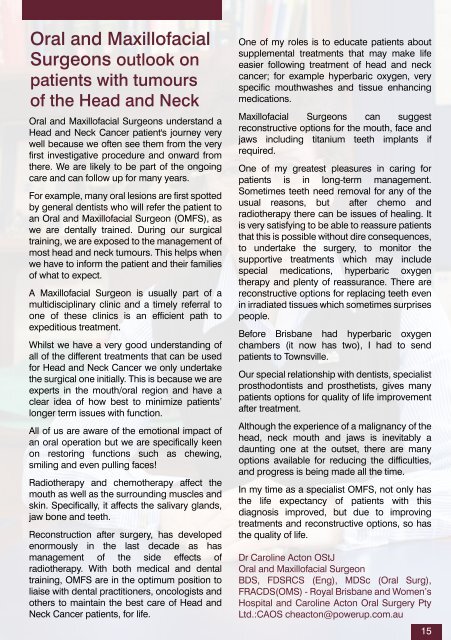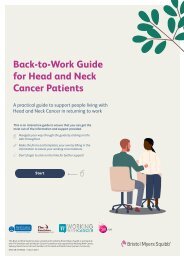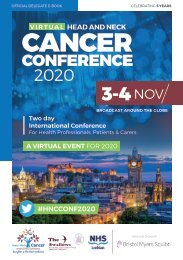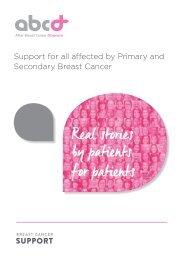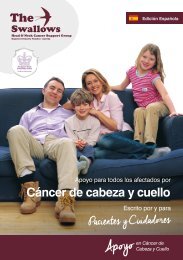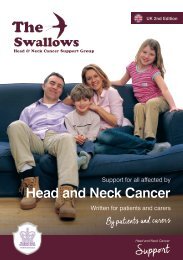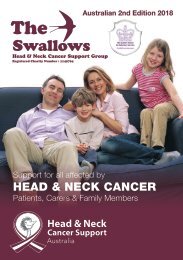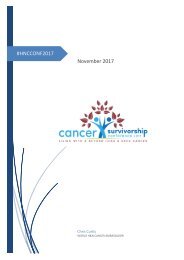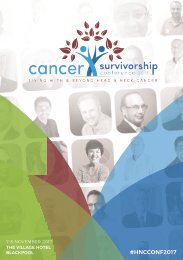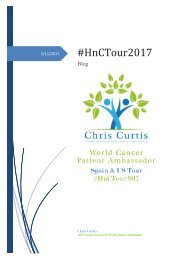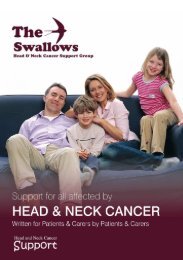The Swallows Australian Edition Magazine
Create successful ePaper yourself
Turn your PDF publications into a flip-book with our unique Google optimized e-Paper software.
Oral and Maxillofacial<br />
Surgeons outlook on<br />
patients with tumours<br />
of the Head and Neck<br />
Oral and Maxillofacial Surgeons understand a<br />
Head and Neck Cancer patient's journey very<br />
well because we often see them from the very<br />
first investigative procedure and onward from<br />
there. We are likely to be part of the ongoing<br />
care and can follow up for many years.<br />
For example, many oral lesions are first spotted<br />
by general dentists who will refer the patient to<br />
an Oral and Maxillofacial Surgeon (OMFS), as<br />
we are dentally trained. During our surgical<br />
training, we are exposed to the management of<br />
most head and neck tumours. This helps when<br />
we have to inform the patient and their families<br />
of what to expect.<br />
A Maxillofacial Surgeon is usually part of a<br />
multidisciplinary clinic and a timely referral to<br />
one of these clinics is an efficient path to<br />
expeditious treatment.<br />
Whilst we have a very good understanding of<br />
all of the different treatments that can be used<br />
for Head and Neck Cancer we only undertake<br />
the surgical one initially. This is because we are<br />
experts in the mouth/oral region and have a<br />
clear idea of how best to minimize patients’<br />
longer term issues with function.<br />
All of us are aware of the emotional impact of<br />
an oral operation but we are specifically keen<br />
on restoring functions such as chewing,<br />
smiling and even pulling faces!<br />
Radiotherapy and chemotherapy affect the<br />
mouth as well as the surrounding muscles and<br />
skin. Specifically, it affects the salivary glands,<br />
jaw bone and teeth.<br />
Reconstruction after surgery, has developed<br />
enormously in the last decade as has<br />
management of the side effects of<br />
radiotherapy. With both medical and dental<br />
training, OMFS are in the optimum position to<br />
liaise with dental practitioners, oncologists and<br />
others to maintain the best care of Head and<br />
Neck Cancer patients, for life.<br />
One of my roles is to educate patients about<br />
supplemental treatments that may make life<br />
easier following treatment of head and neck<br />
cancer; for example hyperbaric oxygen, very<br />
specific mouthwashes and tissue enhancing<br />
medications.<br />
Maxillofacial Surgeons can suggest<br />
reconstructive options for the mouth, face and<br />
jaws including titanium teeth implants if<br />
required.<br />
One of my greatest pleasures in caring for<br />
patients is in long-term management.<br />
Sometimes teeth need removal for any of the<br />
usual reasons, but after chemo and<br />
radiotherapy there can be issues of healing. It<br />
is very satisfying to be able to reassure patients<br />
that this is possible without dire consequences,<br />
to undertake the surgery, to monitor the<br />
supportive treatments which may include<br />
special medications, hyperbaric oxygen<br />
therapy and plenty of reassurance. <strong>The</strong>re are<br />
reconstructive options for replacing teeth even<br />
in irradiated tissues which sometimes surprises<br />
people.<br />
Before Brisbane had hyperbaric oxygen<br />
chambers (it now has two), I had to send<br />
patients to Townsville.<br />
Our special relationship with dentists, specialist<br />
prosthodontists and prosthetists, gives many<br />
patients options for quality of life improvement<br />
after treatment.<br />
Although the experience of a malignancy of the<br />
head, neck mouth and jaws is inevitably a<br />
daunting one at the outset, there are many<br />
options available for reducing the difficulties,<br />
and progress is being made all the time.<br />
In my time as a specialist OMFS, not only has<br />
the life expectancy of patients with this<br />
diagnosis improved, but due to improving<br />
treatments and reconstructive options, so has<br />
the quality of life.<br />
Dr Caroline Acton OStJ<br />
Oral and Maxillofacial Surgeon<br />
BDS, FDSRCS (Eng), MDSc (Oral Surg),<br />
FRACDS(OMS) - Royal Brisbane and Women’s<br />
Hospital and Caroline Acton Oral Surgery Pty<br />
Ltd.:CAOS cheacton@powerup.com.au<br />
15


